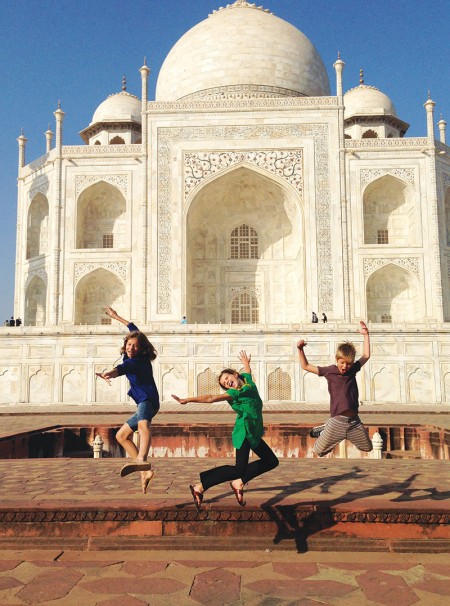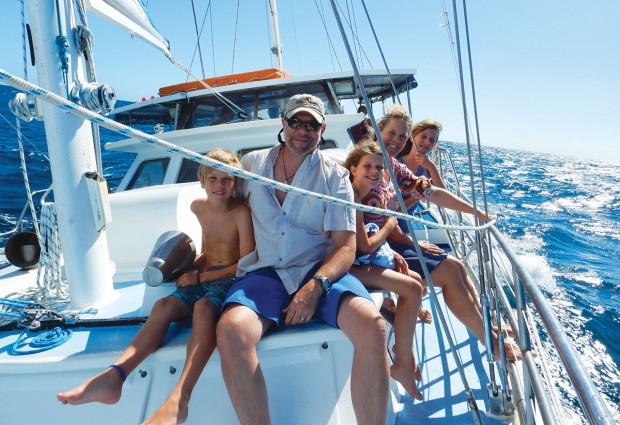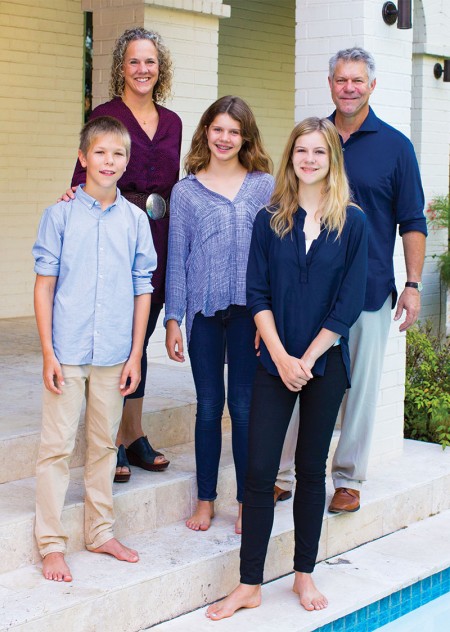Global family: the Waters

This is the second in a series on families who take extended study-abroad trips together. Last month, we visited with the peripatetic Germains. Next month, we’ll catch up with the Kramers in Paris.
Maybe it was the moment when, rappelling down 40-foot cliff drops in a waterfall in Ecuador with “truly terrible” guides, Gerry Waters turned to her children and said, “If anything happens to me, I want you to get my phone and call your father.”
Maybe it was the moment Luke, then 9, nearly sliced off his toe on a barnacle on an island in Thailand with no health-care facilities – and Gerry googled to find that barnacle cuts in tropical waters can be life-threatening.
Or maybe it was the moment when husband Lou was pulled aside by security in the Istanbul Atatürk Airport and sent to jail for breaking an obscure antiquities law – where he was shoved in a cell with five other men – all for buying an antique knife.
The scariest moment of the Waters’ global sojourn is still up in the air; Gerry related their Top 10 in the family blog, World Wide Waters. And the scary stories are fun to tell – but so are the strange and wonderful ones.
The Waters, like the Germains from last month, had been talking for years about taking a trip together around the world. Gerry is British, and Lou’s parents live in the Hill Country, so most family travel time is spent in one place or the other. They wanted to have a trip together – just the five of them. And they realized time was running out before their eldest, Sacha, then 12, would be in eighth grade and applying to high schools.
So in August of 2014, the family – Gerry, Lou, and Sacha; Thalie, who was then 10; and Luke, who was 9, hit the road. Their first stop: Nosara, Costa Rica, where they thrilled to the roar of the howler monkey, iguanas and parrots in their backyard, and waves beneath their feet. In the Coconut Harry surfing school, all three were up on their boards from the first day.
Sadly for Lou, a serial entrepreneur, the idyll was not to last. He had planned to spend the year on the road with his family, but a company he and partners had purchased needed his help. After 10 days soaking up Costa Rica, he headed back to Houston for a while, and the rest of the family soldiered on.
“It was an adjustment,” said Gerry. “We missed him terribly, but this decision saved about 1,000 jobs, so it was definitely the right call.”
Lou joined them at several points along the way for a total of six weeks of their nine-month journey. “We operated broadly on a no-news-is-good-news policy, so would just text back and forth a few times in a week,” wrote Gerry in an e-mail interview. “If ever one of us said we needed to talk, it generally meant:
• (husband) You know I said I was going to join you in Peru/India/Cambodia? Well, something’s come up…
• (wife) Um, I need to pay our hotel bill in cash, and the cash machine won’t give me any more money/Thalie is really, really sick in hospital in India and no one can speak English and I don’t know what to do and I’m really scared
The next stop was Ecuador, where they spent time in the Amazon with a Quichua community, marveling at one-room thatched homes, the abundance of tropical fruit and the white-seeded cacao. They paid a visit to Yasuni National Park, where they swam with electric eels and piranhas (not dangerous, Luke clarified, because “they only attack stuff bigger than them if it’s bleeding, sick or weak.”)

LEAPING LARGE AT THE TAJ The Waters children celebrate the beauty of the Taj Mahal. From left: Sacha, 15 (then 12); Thalie, 13 (then 10); and Luke, 12 (then 9).
Up in the highlands, they visited with weavers in Quito and explored the colorful street markets of Otavalo.
Lou caught up with them for a weeklong exploration of the Galapagos on a catamaran. “It is impossible to describe the impression the islands will make on you, but it is easy to say that they are all you’ve ever heard about them – and more,” he wrote on the family blog.
Next up was Peru, where Lou flew in to join them again for a quick weekend in the Sacred Valley. The remaining Waters took on the four-day Inca Trail hike, learned Spanish in Cusco and went backpacking around rural Peru, stopping in indigenous communities before landing in the stunning southern city of Arequipa. Not content with typical tourist fare, they signed up for a “reality tour,” which gave them an eye-opening glimpse into the deep social inequality of the country, with visits to a shantytown and a stone quarry with slavelike working conditions.
After Peru, it was time to circle home to Houston for a visit with Dad, and then to England to rest and connect with family there and share their adventures. By November, they were ready to set off for a whole other world: India.
Tea plantations and tiger sanctuaries, ancient ruins and modern skyscrapers, mangy dogs and beautiful people – first impressions were overwhelming. Luke was struck by the “man-skirts,” or lunghis; the girls loved the saris and salwars, colorful tunics coupled with matching pants, and the scent of jasmine. Luke loved the curry; Thalie steered clear. After a brief stay in Delhi they flew to Kerala, India’s most prosperous state, where highlights included tours of tea and spice plantations, an elephant ride and a full immersion in the December Hindu pilgrimage.
A place they longed to linger was Varkala Beach, where cliffs line the Arabian Sea and a dip in the waters is believed to wash away sins. Gerry described it as “a combination of Hindu pilgrimage and sacred site, fishing village and low budget Goa vibe.”
But the real highlight in India was the two weeks they spent volunteering at Rising Star Outreach, which supports 15 leprosy colonies and a school – an option they learned about from another family’s travel blog. They lived with the children at the boarding school, eating meals with them, sitting cross-legged, using their hands.
During the day they would travel to different leper colonies in the network and assist medical teams in cleaning wounds, taking blood pressure or maintenance.
They learned contracting leprosy is very unlikely with a healthy immune system, and is easily cured in the early stages – a tragic irony that did not escape them as they attended to those with advanced stages of the disease who were quarantined for life. Still, they were amazed at how peaceful and happy the communities seemed to be.
“The people we went to treat were so friendly and welcoming and amazing that within 20 minutes we were just getting on with it and laughing and singing – and the kids absolutely loved it,” said Gerry. “It was scary, and at same time it was brilliant.”
Likewise, the high point of their time in Cambodia was a volunteering stay with Ponheary Ly, a survivor of the Killing Fields who went from beggar to teacher, saving her money to found a network of schools to take children off the streets. She helps fund the schools by running a guesthouse out of her home, the Seven Candles Guesthouse. The Ponheary Ly Foundation supports 2,800 children with education, food and clothing, and won the World of Children Education award in 2016.
“Staying at her house was amazing,” said Gerry. “She would come and talk to us about her life, and we met her children and grandchildren. We were there for two weeks and spent it between the house and helping in the schools. A hugely generous, funny and gentle person.”
The experience was especially wonderful, she added, given the contrast of the three weeks they had just spent in New Zealand. “We were all miserable,” she confessed. “I let someone else plan it, and we were just driving from one place to another. It’s a beautiful country, but it felt like we were in a car the entire time… there was no connection with the people of the country at all.”
After New Zealand, they still had five more countries and 3.5 more months to go – you can read about it on their lively blog (highly recommended: “Tigers” by Sacha; “Aboriginals in the Blue Mountains” by Thalie; and “So Many Stories” by Gerry.)
I end with wise words from Sacha’s Round-up:
“…But the place where I learned the most about the lives that other people lead was in India. There I saw houses held together by string and a sheer will to survive. There I saw people with stumps for fingers painting beautiful works of art. There I saw poverty. And it was terrifying.
“India is hot and dry and dusty, and its people are poor. And they are wonderfully happy.
“Because joy is free.”
Round-the-world travel advice from Gerry Waters
What would you recommend to others contemplating doing something similar to what you have done?
Gerry: Do it! It doesn’t have to cost a lot of money. But, if you’re going to do it, try to slow down and enjoy where you are rather than rushing from place to place.
Stay with locals, take regular buses and trains; eat in local restaurants – not tourist traps. We sat cross-legged and ate with our hands at the Indian school, and never got sick, but were violently ill after eating in an expensive restaurant.
Also, you can’t and shouldn’t try to take on the whole world. There are so many other places that I wanted us to go, but the balance of at least three weeks in each country was right.
It’s also good to go where you have friends – it’s really wonderful to see familiar faces after a long time of relying on yourselves.
Also, have the adventures! We had some very scary moments, and maybe we got lucky, but it was mainly brilliant. You’re already out of your comfort zone, so push yourself that little bit further, so you never regret not trying something new.
If you do go, don’t over-stress about keeping up with what’s going on at school. I worked our children too hard, and they came back well ahead of their peers, but sometimes I prioritized writing an essay about Charlemagne over going outside and playing with the local kids. Wrong call! My friend Dana Levy-Germain, who went off just after I came home, did a better job than me here.
Do you feel you achieved your purpose?
Gerry: The family-bonding thing didn’t quite work out as we had planned, but my husband did get to come for a while, and it definitely drew us even closer together. We definitely all know each others’ tiniest quirks, best qualities and faults.
The children (and I) now know so much more about the world – its geology, its evolution, its history, plus the different cultures and religions that shape so much of how we perceive ourselves and each other. They still love traveling, are very self-sufficient when traveling, and I am sure that each of them will seek to live abroad at some point in their lives.
Also, little things don’t seem to faze them as much as they used to; I guess that living through sheer terror and desperation at not knowing how we are going to get out of a situation makes us realize that they can get through anything, and the small stuff isn’t so important.
How did your journey change you?
Gerry: Ironically, it gave me a huge appreciation of home, and Houston, and I came home resolved to be better connected to our hometown than ever before. We loved the security of having a ‘place’ where we really belonged, a pillow we liked, and wonderful family and friends constantly close by. For a long time, we didn’t want to move far from home, and are only just embarking on our next big trip this summer (two years later).
We are all keenly aware of how fortunate we are, so in addition to continuing to support all of the non-profits we worked with (in India, Peru and Cambodia), we now volunteer with Direct Hope on a weekly basis to help Houston’s homeless. We also work to help welcome refugees to Houston with the Amaanah Group, and will start working as refugee-education mentors this fall. There are so many displaced people in the world, and we felt isolated and lonely at times, when we had a lot of resources at our disposal. The least we can do, with our home comforts, is help increase security and community for others.
Want more buzz like this? Sign up for our Morning Buzz emails.
To leave a comment, please log in or create an account with The Buzz Magazines, Disqus, Facebook, or Twitter. Or you may post as a guest.




